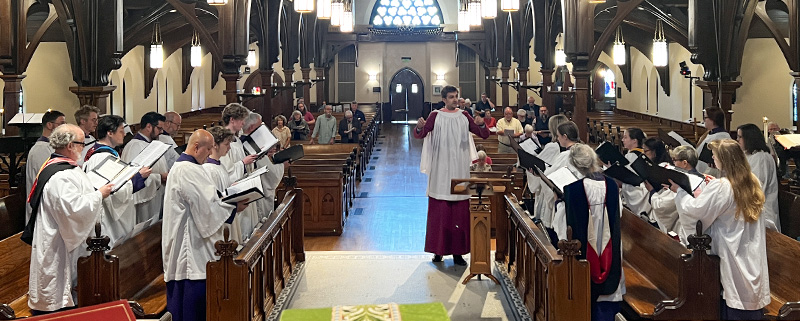Choral Evensong

Choral Evensong is a 45-minute contemplative service of music, readings, and prayers in the late afternoon or early evening. It allows listeners time to meditate and transition from the busyness of the day to the peace and quiet of the evening. Evensong’s distinguishing feature is that it consists primarily of music.
Why Evensong?
Evensong belongs to a tradition of prayer that began with the early Jews, continued with Jesus and his Apostles, and persists to the present day.
The Apostles devised services consisting of Psalms, Scripture readings, and prayers, following a schedule of services for denoted hours of the day. These services mirrored the services which they had attended with Jesus in the synagogues. Even earlier, the exiled Jews in Babylon had developed hours of worship and prayer, "singing the Lord’s song in a strange land” (Psalm 137:4) without an altar or sacrifice. Evensong is a modern form of the worship which Christ and His Apostles offered to God.
Evensong developed out of the Canonical Hours: the eight monastic services throughout the day instituted by the early Church. During the English Reformation, these eight services were reduced to a more manageable two: Morning Prayer and Evening Prayer, also called Matins and Evensong. Evensong is a combination of the final two of the eight daily services: Vespers and Compline.
Evensong’s roots in Vespers and Compline are most evident in the Magnificat and Nunc dimittis, the two songs of praise which are always sung or spoken at Evensong. The Magnificat is always said or sung at Vespers, and the Nunc dimittis is always recited or sung at Compline, so at Evensong, the choir sings both. This combination of texts has inspired a huge and extremely rich body of choral works often informally referred to as “Mags and Nuncs” which extends from the Renaissance to the present day.
In Great Britain, Choral Evensong is much more common than in North America; many cathedrals and collegiate chapels even offer this service several times per week or daily. In North America, however, this is extremely rare. Many Episcopal churches in America offer Evensongs periodically, but fewer than twenty do so weekly or more. This is mainly due to the great time and expense that go into preparing the music for these services. We are very fortunate to be able to offer this service every week.
Structure
- An organ prelude
- Opening sentences: These are read by the officiant (usually a clergyperson, but not always) and are taken from scripture.
- Preces: These are sung responses between the officiant and the choir.
- Psalms: The choir chants the appointed psalms for the day.
- First reading: This is taken from the Old Testament.
- Office Hymn: sung by all
- Magnificat: sung by the choir
- Second reading: This is taken from the New Testament.
- Nunc dimittis: sung by the choir
- Apostle’s Creed: sung by all to a monotone
- Responses: This is the second set of sung responses between the officiant and the choir.
- Choral anthem
- Concluding sentences, blessing, and/or dismissal
- Final hymn: sung by all
- Organ postlude
Music
As one can see, the only non-musical parts of the service are the two lessons and the opening and concluding sentences (and even these latter parts can be sung). As Evensongs are so full of music – a prelude and postlude, hymns, psalms, canticles, preces and responses, and an anthem – it is a tremendous undertaking for the musicians who participate, but well worth the effort. I encourage everyone to attend these services: to hear beautiful music, readings, and prayers; to participate in a tradition that extends back nearly 500 years; and to experience one of the unique offerings of the Anglican church.

